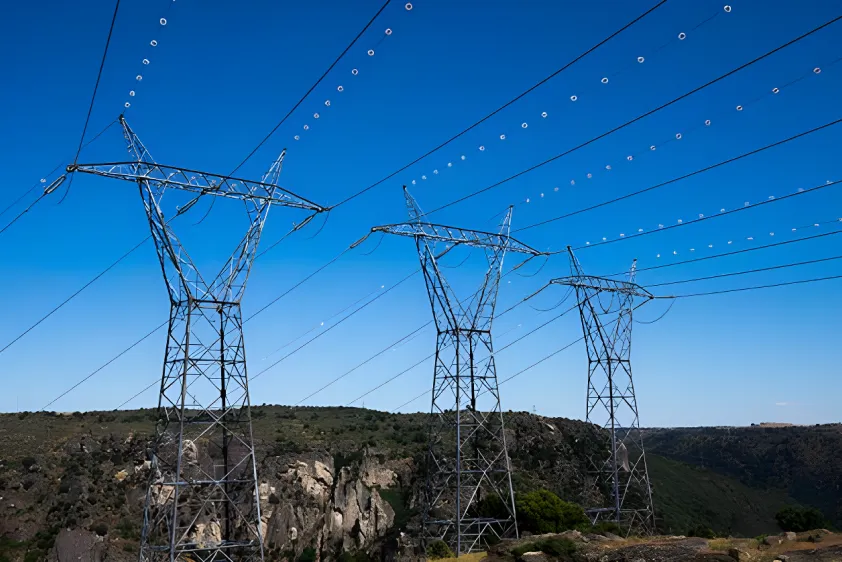ELECTRICITY GRIDS AND ENERGY TRANSITION IN SPAIN
Investing in electricity grids – the cornerstone of the energy transition in Spain
In a context where the use of renewable energies is becoming increasingly important, it is necessary to invest in the development of electricity grids. These facilities allow the energy produced from renewable plants to be transferred efficiently and safely to the points of consumption. In addition to playing a key role in the distribution of clean energy, they are the fundamental pillar to ensure the decarbonisation of energy consumption and thus achieve the energy transition in Spain, while taking advantage of the industrial opportunity it represents.

Power grids powered by i-DE – Iberdrola España's distribution company.
While the focus of the energy transition in recent years has been on the development of renewable energy production facilities, it is essential to emphasise electricity grids – which are essential to connect renewable energy generation with the growing demand for electrification.
Electricity networks, the heart of the energy system
Distribution networks play a key role in facilitating transformative trends in the economy such as electric mobility, heat pumps, self-consumption, and smart cities; as well as in connecting industries attracted by the competitive prices of renewables, and those decarbonising. In this context, on the one hand, it is crucial to digitise the grid at all voltage levels to achieve full automation. This will enable real-time monitoring of each segment and element of the infrastructure; thus improving efficiency and security of supply. On the other hand, it is necessary to enable the required investments to connect this new consumption – through a more flexible planning that even contemplates anticipated investments – in line with what Europe proposes.
At the Iberdrola Group, of which Iberdrola España forms part, we recognise the potential of electricity grids to drive Spain's energy transition. Thus, globally, we have various electricity distribution systems, which cover over 1.3 million kilometres of electricity grids and over 4,500 substations – serving almost 35 million people. In Spain, i-DE, Iberdrola España's distribution company, is responsible for managing and maintaining more than 270,000 kilometres of electricity distribution lines in ten autonomous communities and 25 provinces in the country – supplying more than 11 million customers.
Renewable energy, more economical
Decarbonising 50-60% of industrial heat not only means a considerable increase in electricity demand, but also has important economic implications. By moving towards a cleaner energy mix, energy becomes more affordable and the associated cost of CO2 emissions is avoided.
Moreover, this energy transition is not merely an environmental or economic decision. It is also a strategic decision, as it reduces dependence on fossil fuels and minimises vulnerability to fossil fuel price volatility. Therefore, in order to cope with the increase in electricity demand, robust, reliable and digitised grids are needed.


NewTech Challenge
Electricity grids and the 2030 Agenda
Through the adoption of the 2030 Agenda for Sustainable Development, European Union countries have committed to reducing their greenhouse gas emissions by at least 55% by 2030, and to becoming climate neutral by 2050. To achieve this, electricity grids are key pieces in the European energy puzzle.
However, despite the desire to achieve an economic model based on renewables, more investment is needed to drive their implementation. While investment in renewable energies has grown rapidly, global investment in grids barely reaches 300 billion dollars. According to the International Energy Agency (IEA), this figure should rise to around $600 billion per year by 2030 in order to achieve zero net emissions by 2050.
In this way, the delay in the development of electricity grids may become a hindrance to the energy transition and a brake on the expansion of renewable energies, and the loss of an important industrial opportunity.
Towards a green future, the critical role of electricity grids
For more than a century, electricity grids have been key to supplying energy to homes, factories, offices and hospitals. Their relevance continues to grow with the rapid adoption of clean technologies such as electric vehicles and heat pumps, expanding electricity to areas, until now, dependent on fossil fuels.
Several European studies, such as Electricity Grids and Secure Energy Transitions conducted by the International Energy Agency (IEA) or Eurelectric's Electricity Grids of the Future, promote the construction of electricity grids. The call to implement and invest in these technologies is supported by some prominent voices in European politics. The European Commissioner for Energy, Kadri Simson, states firmly in an article in the Financial Times: "There is no green future for Europe without an upgraded power grid".
The European policy emphasises that plans to promote renewables become infeasible due to a lack of access and fast connection to the grid. It also states that Europe needs to invest almost 600 billion euros in its electricity grids by 2030. The European Commissioner for Energy encourages focusing the energy debate on electricity grids and asserts: "Improving the electricity grid will connect Europe towards a sustainable future". As a result, the European Commission took the initiative to present its action plan for electricity grids on 28 November 2023.



Investment in the electricity network in Spain
Regulation of distribution networks, a key point in their development
The current regulatory mechanism for recognising and remunerating investments in electricity grids in Spain entails risks and uncertainties for grids companies. These risks, together with insufficient remuneration of invested capital, not only delay the achievement of decarbonisation targets, but also extend to the supply chain and have a direct negative impact on the country's economy. Therefore, it is crucial to implement reforms to the feed-in tariff system to encourage investment for the next regulatory period (2026-2030).
Thus, it is urgent to undertake regulatory reform to promote investment in distribution and facilitate grid development to meet the connection needs of the new electricity demand. In short, an intense and early deployment is required and, to this end, as a first step, the current investment cap, which limits the amount of investment in the distribution network to 0.13% of GDP, must be removed. In addition, it is key to consider whether the current network planning model (especially the transport network, which affects the distribution network) is suitable or should be reviewed.
The advantages of electricity grids for Spanish society
Electricity grids play a crucial role in the development and well-being of Spanish society – offering a series of advantages that have a positive impact on various aspects of daily life.
Below, we highlight some of the main benefits:
-
Environmental sustainability: Currently, 75% of energy consumed is polluting. To achieve a transition to more sustainable energy sources, such as renewables, electricity distribution networks are needed. They need to be deployed as far in advance as possible so that they are available when customers request connection.
-
Energy efficiency: Renewable energy generation is the most efficient way to produce electricity as there is no waste or heat loss in the energy conversion processes. In addition, smart grids are a very efficient way of delivering energy to the end consumer. The ease and convenience of using electricity allows optimising consumption and encourages energy efficiency practices. All this ensures the achievement of a sustainable energy system in the long term.
-
More economical: As the composition of the energy supply becomes decarbonized and electrified, the cost of energy decreases and energy uses become more affordable as renewables become cheaper and energy conversions for mobility and heat become much more efficient.
Related information









